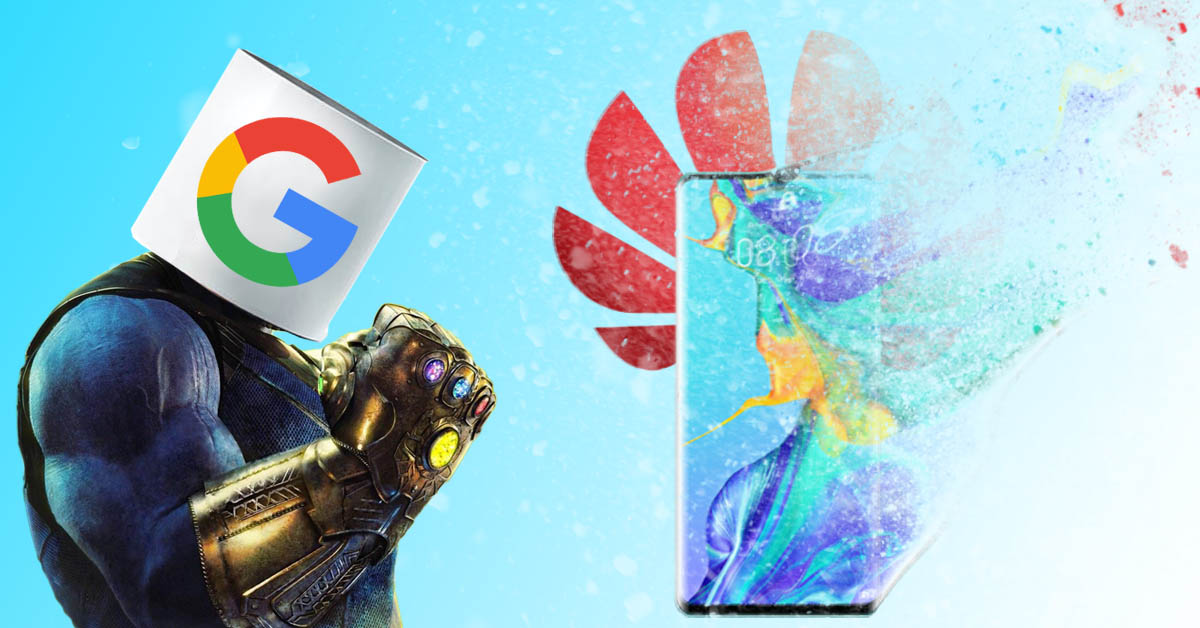
Huawei is on a roll. To be completely honest, it was on a roll from quite a while ago. Surpassing Apple to become the second largest smartphone company, and having a surge in sales while others reported a decline in sales. Well, Huawei is, still, on a roll…just in the opposite direction!
I don’t think this will come as news to you. It’s no news that following the US government’s sanctions, Google has revoked Huawei’s Android license. This is a grave matter of concern. And as we discuss this, you’ll really need to strap in. But here’s a TLDR too!
TLDR: The Summary
Long story short, Google revoked Huawei’s license to use the Android platform on its devices. That comes after the orders from the US government forbidding US companies to carry out transactions with the company. And so, Huawei will no longer be able to use Android and other Google services in their products.
This doesn’t mean your current Huawei phones are in danger. They will continue to operate. So, if you, recently, bought a Huawei P30 Pro or a P30, or any other Huawei device for that matter, they will work as it is. You will be able to use Google’s products like maps and access the Play Store without restrictions. You’ll even be able to update those apps of yours. Google made it clear that your present Huawei phones will still work fine and dandy.
However, the ban means that your Huawei devices will not get future updates – software, or, otherwise. The problem starts with the future. No OS updates, or security patches. In addition, future Huawei devices cannot run Android, at all.
To be clear, Android is a free open-source platform, which means, Huawei can still use the base of the Android framework to develop their own. But that creates its own source of problems, because, they still won’t be able to use Google apps and services like Location, GPS, and other apps like Gmail and YouTube, to name a few.
Of course, Huawei has responded to this by claiming they will continue providing updates for current phones, and also that they have a plan B in place. So, it’s not all bad.
But not only Google, US firms like Intel and Qualcomm will also stop providing chips to the company. So, their laptop lineup is in jeopardy, too. For the time being, the US has given them a 90-day lift on the ban. In this time, they can purchase US products necessary to maintain their current network and tech, but not for building new ones. Will this time be enough? Or maybe the two will come to some sort of agreement. That remains to be seen. But for now, Huawei has already stated they won’t bow down to pressure. So, all eyes on them!
The Story: All you need to know
Where do we begin?
Huawei
It started in 1987, when Ren Zhengfei, a retired deputy director of the People’s Liberation Army in China, founded the company. Initially, it focused on developing phone switches while spending vigorously on R&D as well. It went on to develop networking technologies and soon, moved to smartphones and consumer products. In 2005, it had a 5% share in the global smartphone market! Fast forward to this year (before the ban), it holds the second position in the market.
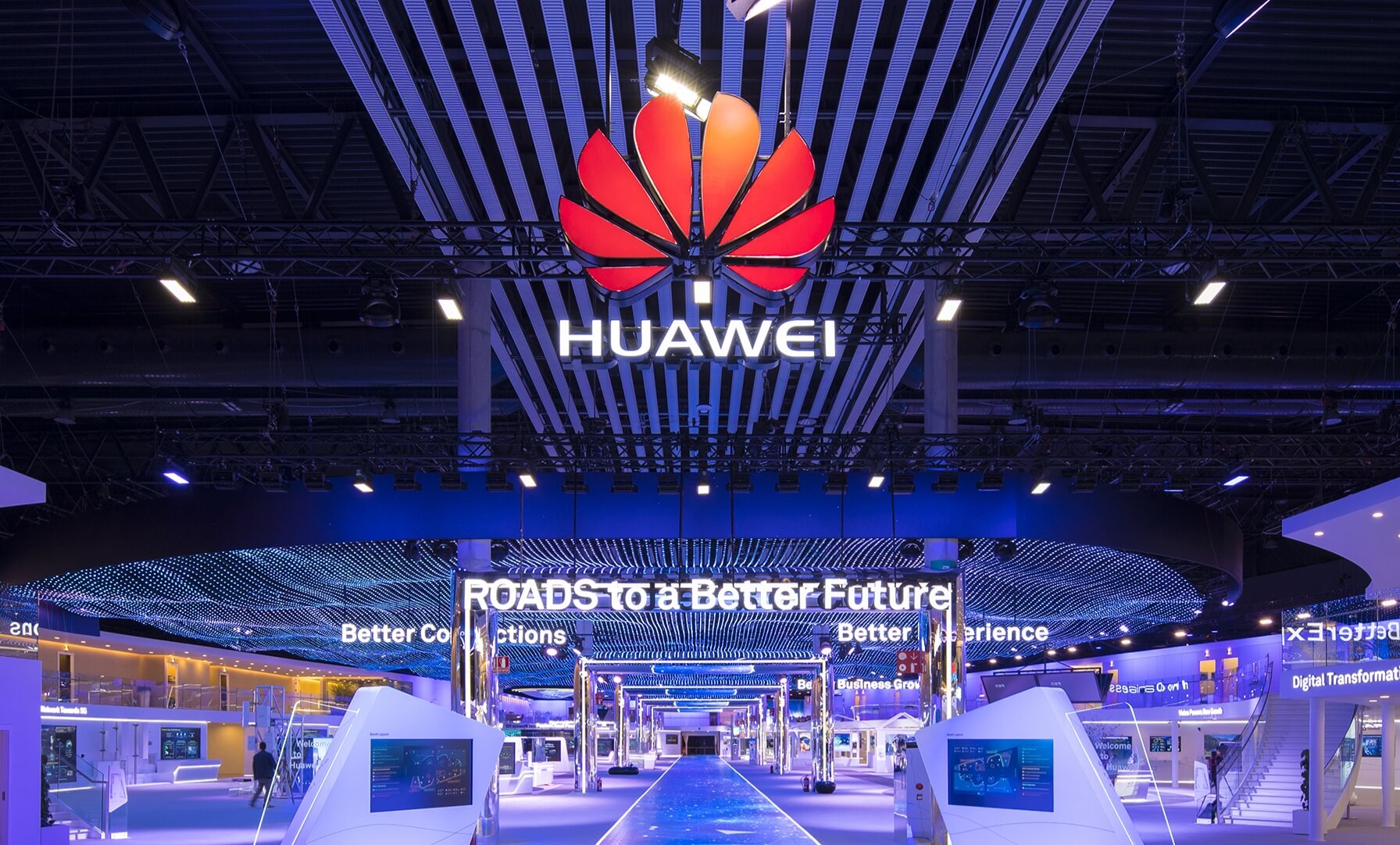
Not only that, Huawei is the leading company in 5G technology right now. It has contracts with many countries for the development of 5G infrastructure, including Nepal. Huawei’s 5G equipment is considered cheaper and more advanced than from others, like Qualcomm. But herein, lies the accusation – that Huawei’s 5G firmware has a “backdoor”. This backdoor can apparently be used to acquire any information that passes through. And so, poses grave security issues.
Accusations
Now, this is not the first time Huawei has been accused of posing security risks. Currently, Huawei faces almost 2 dozen criminal charges filed by the US authority! And some say that Huawei is really the most controversial company right now.
Back in 2003, Huawei was accused of stealing the intellectual property of US-based organizations like Cisco – the network hardware maker. In 2014, it was accused of technology theft from Tappy – a phone testing robot from T-Mobile, which was settled in a Civil lawsuit. In between, there has been a lot of such.
We won’t go into all the accusations in detail. The point is, Huawei has been accused of such things, time and again. But we haven’t heard of any grave consequences of such actions, and so, we cannot really say what Huawei’s up to. The accusations go from technology theft to fraud, to stealing military secrets from the US, to sabotage US infrastructure.
Also, Meng Wangzhou, CFO of Huawei and Ren Zhengfei’s daughter, was arrested in Canada (December 2018), on the US orders, for bank fraud and technology theft. But, moreover, it was for her involvement with Skycom and doing business with Iran, which is against US sanctions. Both Huawei and Meng have denied the accusations, but this has led to rising tensions between China, the US, and even Canada!
The Reason
Now Huawei faces a lot of accusations, almost all of them from the US government. This may lead people to believe that it’s, in fact, the US govt. that is biased towards the company. But there are some valid reasons behind the accusations.
First, as aforementioned, Ren Zhengfei, the founder and CEO of Huawei, served in the People’s Liberation Army back in the days. Being the one behind developing technology for the army, and as the deputy director of the army, he has very close ties with the Chinese government. So, the US suspects the company of spying on other governments using their 5G technology in collaboration with the Chinese government.
Is that enough base to accuse a whole company of such charges? No. But the Chinese government uses aggressive surveillance tools in their country on the people and all other entities. So Huawei, being a Chinese company, is bound to be under close surveillance as well. In addition, Zhengfei’s close ties to the Chinese govt. only adds fuel to the fire.
If it weren’t reason enough, China, back in 2017, passed the NIL (National Intelligence Law). This law states that “If asked, the Chinese companies and citizens must help the government and assist in National intelligence efforts”. While China claims that is to safeguard their own security, it can be used to exploit Huawei’s data via the “secret backdoors” in Chinese 5G technology.
And why is this so scary? Apart from military secrets and data, the application of 5G is much more than faster communication. 5G opens new areas like controlling water-reservoir dams, and national power grids, data centers, and every other significant national infrastructure. If Huawei is, indeed, guilty of all these, they will actually have the power to freeze the nations with a single snap! So, there is a good reason for paranoia, if you think about it.
However, Huawei claims that they have always maintained independence, and many of these accusations are a result of the US-China Trade War!
The US-China Trade War
Now, this is something that has been going on for some time, and frankly, is very comprehensive. For the two strongest economies in the world, to have at it is, well, natural, I think. But president Trump complained about China’s trade practices before he took office in 2016. And after he did, well…
According to BBC, the US launched investigations into Chinese trade policies in 2017. Also, it imposed tariffs on billions of dollars worth of Chinese products in 2018. In addition, there was a hike in duties from 10% to 25% on over $250 billion Chinese goods recently – not only to discourage the use of Chinese products inside the US but also to promote their own.
Beijing hit back with tariffs of their own on about $110 billion worth of US goods in their country. And so, the biggest trade war in history began. And many believe that this is why the US is trying to corner Huawei – as it’s on its way to becoming the leading telecommunications company in the world. Because Huawei’s 5G equipment is cheaper and has a more advanced tech. So, others might prefer Huawei over others. But, with these accusations in place, many countries are reluctant to use Huawei’s technology now. So, is this all a clever ploy?
We really can’t tell. But here’s the current scenario.
Present
Huawei faces a growing backlash from Western countries led by the US over the possible risks posed by its products in the next-gen 5G networks. The US leads the campaign against Huawei, both in terms of making the case about security threats it poses, and also legal cases alleging the firm of intellectual property theft and fraud.
And due to this, many countries have restricted the use of Huawei’s 5G equipment in their countries. Japan, France, and the Czech Republic are already on board with this, while Germany is reviewing their policies. Australia already banned Huawei’s components last year and ZTE’s too. However, the UK is still positive about Huawei. The UK states that they will continue using Huawei’s equipment, but in a controlled way so that even if there’s a threat, they can monitor it themselves.
What’s interesting, here, is that the US, UK, and Australia are the 3 members of an Intelligence Sharing Pact called the Five Eyes Alliance. And while New Zealand, one of the other members also banned Huawei, Canada is still on the fence. And with the UK supporting Huawei, New Zealand and Canada might even reconsider.
In addition, Huawei is trying to make amends. It is willing to sign no-spy agreements with governments as concerns over the security of its products used in the mobile network continues to grow. Of course, it’s not doing a good job of convincing them, as we can see. Huawei is already on the US’s Entity List, which is also considered as the “Death Penalty”. Companies, in this list, cannot do business with any US companies or entities. ZTE was in this list too, which was revoked after ZTE agreed to pay a $1 billion fine and close surveillance to the company.
The Android Scenario
Back to the topic at hand, here are the details regarding Google’s ban on Huawei.
This comes after the US sanctions following the accusations of Huawei spying and other allegations in place. It’s not only Google, but all US firms are restricted from doing business with Huawei. However, as this is the one which impacts the company the most, it receives the most attention.
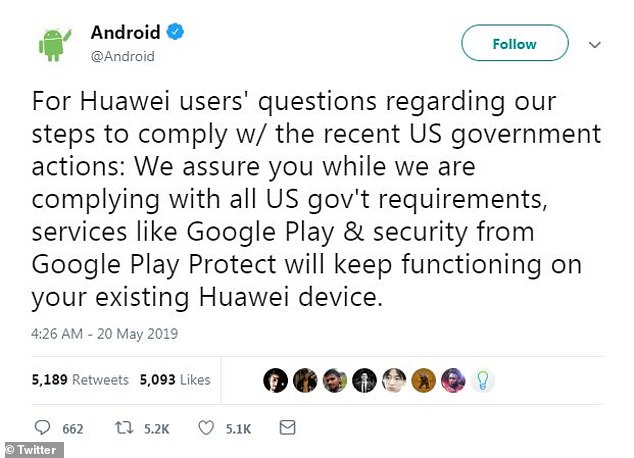
Google, however, made it clear that Huawei’s current phones will continue working without any problems. They will get all app updates and Google services. It is because the present devices are already certified under CTS (Compatibility Test Suite) and VTS (Vendor Test Suite). Once a phone goes through them, the phone is fully functional in all aspects. Even the Honor 20, that launched very recently amidst the chaos is fully functional.
The only problem lies in the security patches and software updates that Huawei devices won’t receive. While Huawei runs on EMUI, it can create its own patches and updates, but it will take a lot of time. As Huawei responded saying they will continue providing sustainable software updates, it will, nonetheless, take time to arrive on Huawei phones.
This is because Google gives Android device makers their software fixes codes about a month before it makes it public about vulnerabilities in the current system. And this gives manufacturers enough time to check the patches so that it won’t cause problems for their own proprietary software and then package up a customized version of the fixes. But now, Huawei will learn of such patches at the same time as they’re released on the AOSP. So, security updates will be delayed.
Furthermore, a more grave problem lies for upcoming Huawei devices. The new phones, even if they can use the AOSP (Android Open Source Platform) to develop their own software, they can’t call it Android. Because Android is actually a brand of Google and with the revoked license, they don’t have the Android certificate anymore.
Not being able to call their software Android seems like it’s a minor inconvenience. But this means a lot more. Google is suspending all business activities with Huawei related to “non-public” transfers of hardware, software, and technical services. This means Huawei won’t have access to:
- The Google Play app store
- Google apps like Calendar, Music, Google Photos
- Google Assistant
- Gmail and YouTube
- Tools that allow 3rd-party services access to certain functions
Let’s break it down. First, no play store means no viable way of downloading all the apps that are on your phone. Okay, let’s say they create their own app store. But getting developers to create apps for them will require a lot of investment, which investors may not be willing to. Now there are alternative stores that can help you access apps like those. But again, Google prevents its own apps from being installed on uncertified phones, so, there’s that as well.
The 2nd might be just an inconvenience. They can easily replicate those apps. Also, Google Assitant is, right now, the best virtual assistant there is. But they might be able to create their own virtual assistant as well. So, no big deal.
Gmail and YouTube. Okay, I can’t imagine my life without those two. These two tools are part of my daily life, and not a day goes by without me using them. Granted, we’ll still be able to access them via a different mobile browser. But the experience is not just the same! This has to be the biggest let down!
Of course, a more serious matter is the tools that make Android, Android. For example, Push notifications is something that enables apps like Facebook and Twitter to send notifications to your phone. So, without this, no more notifications! Also, there are many other aspects Huawei won’t be able to use…so, it seems like they’re doomed!
Furthermore, other companies like Qualcomm and Intel will also stop business activities with Huawei. Now, Qualcomm’s restriction may not be that threatening. After all, Huawei makes their own chips. But Intel is their sole supplier for their laptop line, such as the Huawei MateBook X. So, their laptop line up is under even more pressure.!
But this is, after the 90-day ultimatum. This ultimatum allows Huawei to purchase products from these US firms to maintain their existing network. However, they cannot purchase equipment to create newer technologies.
Huawei’s Response
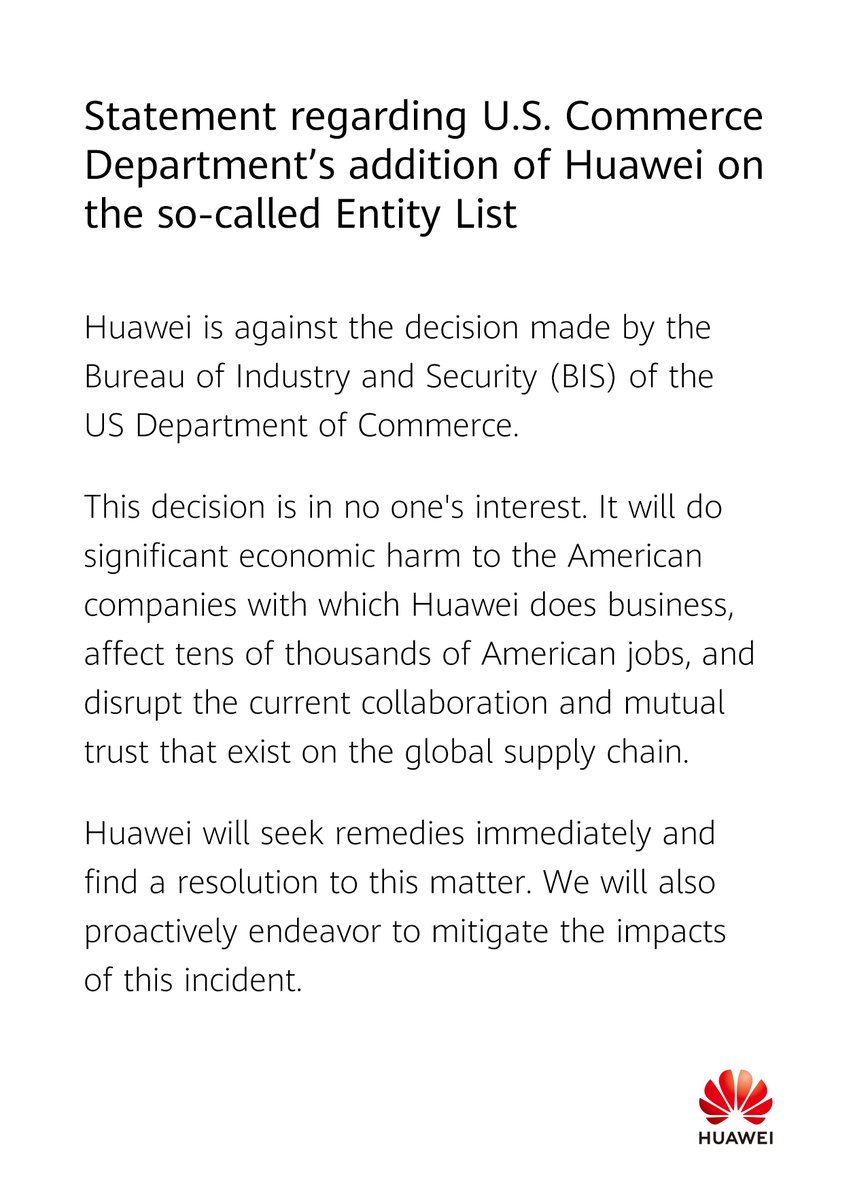
Huawei already responded to this, of course. They claim that they are not bowing down, and even praised the US firms for trying to convince the US authorities against this decision. Yet, they seem to be calm even under all this fire. They claim to have a stockpile of chips to last them months. And who knows? Until then, this might all be over too.
Also, they have a plan B in place. Plan B comes in the form of an entirely new operating system, that was, apparently, in the works since 2012. Huawei foresaw this situation might come someday, and started working on their own OS. And reportedly, the new OS is called “Hongmeng”. If this comes into play, it could even change the whole smartphone market!
But as we already discussed, with a new OS comes new problems. A new ecosystem might not be appealing to all the people. They’ll have to make their own app store, which requires convincing developers and investors, too.
But my concern is will they be able to pull it off? A whole new ecosystem competing alongside Android and iOS. Because we’ve seen others try and fail! Nokia and Microsoft tried pushing Windows phones. They were decent phones, but they failed because they couldn’t convince developers to develop apps for their Windows stores.
Samsung developed its own Tizen OS because it claimed Android had a very large grip over everything. While Tizen OS only made it popular enough for their smartwatches, Android actually loosened its grip, because, maybe it sensed a threat! So, I have quite mixed feelings about the new OS from Huawei.
And a part of the mixed feelings includes suspicions, too. Because, If Huawei already foresaw this, that something like this was coming, were they really doing something not-so-good, and this is their contingency plan?
What’s Next?
Okay…so what’s next for Huawei and others?
In the short term, Huawei phones won’t sell well. That is all. Because who wants a phone without Android? Not many. As for Android Q, it is uncertain if it’ll make it to upcoming Huawei phones. Because, most of their source code might have already been shared, as such is the norm in the smartphone industry.
This is the result of only Android restriction. Not talking about other repercussions like countries banning Huawei technology. Because who knows what’s next for that? Things are getting way too political for taste, and let’s not step into that.
In the long-term, however, things might turn out good. Smartphone vendors might get a good reason to seriously consider the need for a viable alternative to Google’s Android! And at a time when Google’s pushing out its own Pixel brand! Right now, iOS and Android are the leaders. And starting with Huawei, other Chinese phones might rally behind a new ecosystem. This can be a turning point for the whole smartphone industry.
Winners and Losers
In any situation, there are always winners and losers. And in this, there are quite a few in both.
On the losing side, it’s, of course, Huawei and Honor that take the first hit. Phones not selling well to brand image going down, we know the consequences too well. Users, like us, might lose a good smartphone brand. Google themselves, are losing a major player. Android might face tough competition with a new ecosystem. And of course, component suppliers such as Qualcomm and Intel will need new customers as well.
However, there are winners. Xiaomi, which is the 4th largest smartphone company, might rise up to the occasion. Apple, of course, if this continues, might get back to 2nd! And then there are BKK subsidiaries like Oppo, Realme and OnePlus, who will be more than happy to fill the gaps created.
Rounding up & Opinions
So, what can we make of all this? Actually, there is just so much going around that we cannot come to a specific conclusion.
My first thought? President Trump and the US government is paranoid and biased. They’re using their power to corner one of the best smartphone companies in the world, and have a shot at their economy! What does that bring them? Money and Power, of course! Besides the US-China Trade War, this is also about the 5G Race! It’s a race Huawei’s winning with its superior and more affordable tech. So, this is just another dirty trick to win the 5G race. Winning that would mean the creation of 3 million jobs and a $500 billion dollar growth in the US GDP…which would ensure its position as the largest economy in the world. In addition, controlling 5G means controlling the world…in some way, as information is power these days. So, this is nothing but a clever ploy…
Because if they were really concerned about data privacy and security, what about Facebook? The company who stole and sold data of millions of people, of not only US citizens, but people all around the world? And the Cambridge Analytica scandal…
But again, I can’t say Huawei’s innocent either. The fact that they had a plan B since a while ago, for circumstances such as this, raises suspicions. And Huawei’s 5G equipment is receiving bans as it apparently has a backdoor on the firmware. This issue cannot be rectified with software, so, those who are using Huawei’s 5G services might really be exposed. And if this is, indeed the case, how can we believe that their new OS won’t be spying on us?
Yet, I, or any of us, cannot be pointing fingers. Because nothing is proven, yet. None of the allegations have been proven. And if we try to analyze a certain aspect, it goes in too deep. We’re better off not drawing conclusions. Let’s just hope for the best consequences for everyone. That is all!
But by the time you’re reading this, a lot could have changed, too!
Update 1: Seems like Google revoking Huawei’s license is the least of its worries. Huawei has its ARM cut off, too!
Update 2: SD Association removed Huawei from its membership too. SD Association is a trade group that agrees on the standards of SD cards. But with the revoking of membership, Huawei phones will no longer be able to include microSD cards in their phones. One after the other, companies are banning the tech giant. However, this may not affect them in a very severe manner, as they are already developing their own proprietary nano-memory cards for their phones. Only their mid-range and budget lineup might suffer for a while until they come up with nano storage for those too!
Update 3: And after SD cards, Huawei is also banned from the WiFi Alliance – which influences decisions regarding Wireless technology. WiFi Alliance is a group consisting mostly of American technologies, so, in compliance with the US Government’s decision, it has banned Huawei. However, the ban is temporary for now, and it didn’t revoke Huawei membership – just temporarily banned Huawei from influencing the decisions they make.







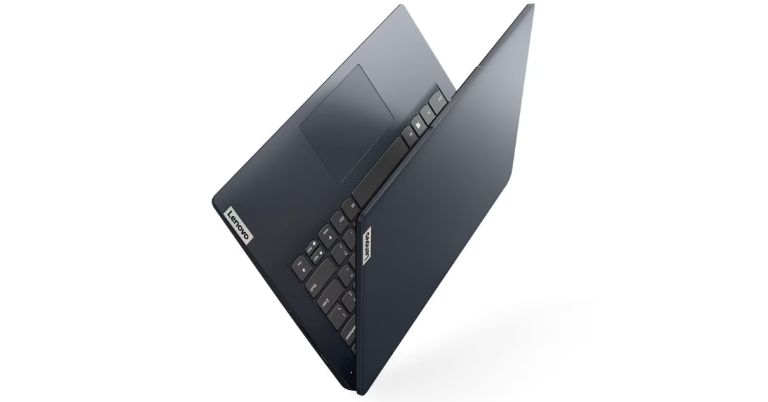
![Best Gaming Laptops in Nepal Under Rs. 250,000 (रु 2.5 Lakhs) [2025] Best Gaming Laptops Under 2.5 lakhs in Nepal [Feb 2025 Update]](https://cdn.gadgetbytenepal.com/wp-content/uploads/2025/02/Best-Gaming-Laptops-Under-2.5-lakhs-in-Nepal-Feb-2025-Update.jpg)
![Best Gaming Laptops in Nepal Under Rs. 120,000 (रु 1.2 Lakhs) [2025] Best Budget Gaming Laptops Under Rs 120000 in Nepal 2025 Update](https://cdn.gadgetbytenepal.com/wp-content/uploads/2025/05/Best-Budget-Gaming-Laptops-Under-Rs-120000-in-Nepal-2024-Update.jpg)
![Best Laptops Under Rs. 80,000 in Nepal [2025] Best Laptops Under 80,000 in Nepal March 2025 Update](https://cdn.gadgetbytenepal.com/wp-content/uploads/2025/03/Best-Laptops-Under-80000-in-Nepal-March-2025-Update.jpg)
![Best Laptops Under Rs. 70,000 in Nepal [2025] Best Laptops Under 70,000 in Nepal March 2025 Update](https://cdn.gadgetbytenepal.com/wp-content/uploads/2025/01/Best-Laptops-Under-70000-in-Nepal-March-2025-Update.jpg)
![Best Mobile Phones Under Rs. 15,000 in Nepal [Updated 2025] Best Phones Under 15000 in Nepal 2024 Budget Smartphones Cheap Affordable](https://cdn.gadgetbytenepal.com/wp-content/uploads/2024/03/Best-Phones-Under-15000-in-Nepal-2024.jpg)
![Best Mobile Phones Under Rs. 20,000 in Nepal [Updated] Best Mobile Phones Under NPR 20000 in Nepal 2023 Updated Samsung Xiaomi Redmi POCO Realme Narzo Benco](https://cdn.gadgetbytenepal.com/wp-content/uploads/2024/01/Best-Phones-Under-20000-in-Nepal-2024.jpg)
![Best Mobile Phones Under Rs. 30,000 in Nepal [Updated 2025] Best Phones Under 30000 in Nepal](https://cdn.gadgetbytenepal.com/wp-content/uploads/2025/01/Best-Phones-Under-30000-in-Nepal.jpg)
![Best Mobile Phones Under Rs. 40,000 in Nepal [Updated 2025] Best Phones Under 40000 in Nepal 2024 Smartphones Mobile Midrange](https://cdn.gadgetbytenepal.com/wp-content/uploads/2024/02/Best-Phones-Under-40000-in-Nepal-2024.jpg)
![Best Mobile Phones Under Rs. 50,000 in Nepal [Updated 2025] Best Phones Under 50000 in Nepal](https://cdn.gadgetbytenepal.com/wp-content/uploads/2025/01/Best-Phones-Under-50000-in-Nepal.jpg)
![Best Flagship Smartphones To Buy In Nepal [Updated] Best flagship phone 2025](https://cdn.gadgetbytenepal.com/wp-content/uploads/2024/07/Best-Flagship-Phones-who-is-it-ft-1.jpg)